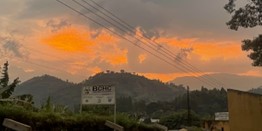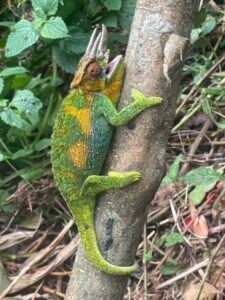This is my last day in Bugoye, Uganda and as I look at the sunset over the health center framed by the foothills of the Rwenzori Mountains, I reflect on the past six weeks in this beautiful country. I have had the privilege to work on a study of pediatric severe malaria at a nearby Level IV health center for my practicum while also exploring some of the national parks and wildlife that “the pearl of Africa” has to offer. It has been a challenging and rewarding experience.

We hit the ground running as soon as I arrived in Bugoye with work on the Severe Malaria study. Due to delays in IRB approval, data collection had not yet begun when I arrived, so I worked with the Severe Malaria team to ensure data collection forms were working properly, and to troubleshoot issues that arose when we began data collection. I’m grateful to be working with a highly motivated and friendly team, who are continuing data collection as I prepare to leave Uganda. While there were certainly challenges with starting up a new study in a new research site, the most challenging aspect of this work for me personally has been seeing the children with severe malaria when they arrived. Many children suffer from some of the worst symptoms of severe malaria upon arrival. Convulsions, changes or loss of consciousness, and severe anemia were commonplace. Some are in a truly critical state, and each instance I witnessed was heartbreaking. However, I’ve also been amazed by the miracle of modern medicine. Within 3-4 days of receiving treatment, it was not uncommon to see a young child who arrived in grave condition to be alert and playing. Seeing this incredible transformation from the dire state in which many arrive was incredibly heartening. Additionally, seeing the devastating effects of this disease up close has inspired me to continue working on this study through data analysis in the upcoming semester. This has been a transformative experience, and I could not be more grateful for all I’ve learned during my six weeks here.
I’ve also had the opportunity to explore the scenic areas that surround Bugoye. Among these incredible experiences, one day stands out as an absolute highlight – a challenging 18-kilometer (11 miles) hike that took us to a glacial lake at an elevation of 9,000 feet within the Rwenzori Mountains. Although this was a strenuous hike, we were rewarded with views of towering mountains, waterfalls, and the lake at the summit. Our guide, Michael, proved to be an invaluable companion on this hike. His extensive knowledge of the local flora and fauna enriched our understanding of the ecosystem that surrounded us. With an uncanny ability to spot even camouflaged animals, he helped us see two distinct monkey species swinging gracefully through the treetops. We even found a three-horned chameleon, a true testament to the region’s biodiversity. I also embarked on another excursion to Queen Elizabeth National Park. Here, I had the privilege of seeing chimps high in the treetops during a chimp trek. Moreover, I enjoyed a tranquil boat safari along the park’s main river, where we saw elephants, hippos, a baby crocodile, and dozens of different species of birds!

My time in Uganda has not only been defined by the invaluable work on the severe malaria study but also by these unforgettable encounters with the country’s natural wonders. These experiences have provided me with a profound appreciation for the remarkable diversity and beauty of Uganda’s landscapes and wildlife, making my journey a truly transformative one. I’m looking forward to using this experience to influence my Public Health career in the future.
-Jennifer
